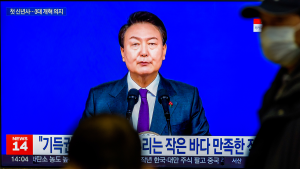Could an Asian NATO be in the Cards?
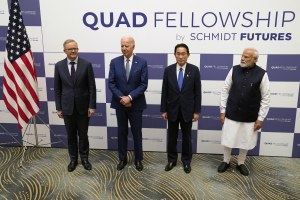 Play Podcast
Play Podcast
About the Episode
The Asia-Pacific region is witnessing a seismic shift in power dynamics as nations like Japan, Australia, and the US forge a game-changing partnership to counter China's influence. The big question: could this lead to a new NATO for the Pacific? And what would that mean? Experts Michael Green and Karl Friedhoff dissect the motives, strategies, and potential outcomes.
- Never Say Never to an Asian NATO, Michael Green, Foreign Policy, September 6, 2023
[Lizzy Shackelford: INTRO: This is Deep Dish on Global Affairs— going beyond the headlines on critical global issues. I’m your host, Lizzy Shackelford, with the Chicago Council on Global Affairs.
Today, we're delving into a hot topic that has been making waves across diplomatic circles and news headlines alike: the concept of an 'Asian NATO.' The world is witnessing a seismic shift in power dynamics, particularly in the Asia-Pacific region. Nations like Japan, Australia, India, and the United States are forging unprecedented partnerships to safeguard regional stability and counterbalance the rising influence of China. Will this ultimately lead to a new NATO for the Pacific? What implications would that have for the region? And, most importantly, would it bring more or less stability for people in the countries involved?
Here with me to dive into the world of the Asian NATO is...
Karl Friedhoff, the Chicago Council’s very own fellow for Asia Studies. Prior to this, he was based in Seoul where he was a program officer in the Public Opinion Studies Program at the Asan Institute for Policy Studies.
And we have Mike Green. Mike is the chief executive officer at the United States Studies Centre at the University of Sydney and is the author of recent Foreign Policy article, “Never Say Never to an Asian NATO”.
So, Mike’s article is what really got us thinking about this topic for today’s conversation and Mike says that he is not advocating for an Asian NATO right now and he doesn’t think it would be possible for a variety of reasons. One is that...]
Michael Green: all of us, including the US have pretty dense economic relations with China. and the second is that, once you form a collective security, agreement like that, you foreclose a more cooperative future with China. You kind of make your bet on the dark side of history. So I'm not advocating, and I don't think we're there now, but I did want that piece to get people thinking, because the dynamic we're seeing is that the so called hub and spoke system of bilateral American alliances, unlike NATO and Europe, which is a multi-member collective security arrangement, in Asia and the Pacific, we have bilateral alliances with Japan, with Australia, Korea, and so forth. Very much by design. We can talk about why, but what you're seeing is that these are coming together more, the quad, which includes the US Japan Alliance, US Australia Alliance and India. ACUS, which is a US Australia, UK technology and defense industrial alliance partnership. the most recent one is the US Korea trilateral statement. President Biden and his counterparts, President you and Prime Minister Kishi to put out. in Camp David. All of these are merging of what were bilateral alliances that did not have such a direct and explicit pattern of cooperation. Why? I mean, the governments don't like to say it out loud, but it's very straightforward why, China. And if we're going to have an Asian NATO, it's not going to be for good reason. It's gonna be for a bad reason, which is China makes it necessary. But this trend line shows you that these alliances are prepared to do more together if China forces us to. That's why I never say never do a NATO.
Lizzy Shackelford: Absolutely. And you, Karl, you've written a fair amount about the quad recently. I think that's something that, you know, people have heard of, but a lot of our listeners probably aren't that familiar with what it is, what it might be similar to, and what makes it different from, let's say an Asian NATO, for example. Can you talk a little bit about what that, multilateral entity is and what its purpose is for the members?
Karl Friedhoff: So, the quad is the country grouping of the United States, Japan, Australia, and India, and what its purpose is, essentially to roll back the influence of China around the Indo Pacific, right? And it's doing that through three pillars. If you look at the leader's statements and those pillars are stability, which is a stand in for security, development. And prosperity so far, a lot of the development has been along the stability slash security side. You know, it's much easier for the militaries to get exercises together. So, we just saw Malabar happen off the coast of Australia. So, it brings all the militaries together. They run through that. And essentially, it's stand in for how they're going to approach security, how they're going to cooperate if there were to be some kind of flashpoint throughout Asia, and obviously they're thinking a lot about Taiwan at this point, as long as, the Malacca Straits, through Singapore, what they have not done much on is on the development and prosperity side, so far, the developments there are lagging behind. It's led some people to say that essentially the quad is a form. Without a function and essentially what the piece that is missing from all of this is the economic side. And so as, they're working on the security side, economics is dragging behind and that's turning a lot of the countries in Southeast Asia, maybe not against the quad, but they're certainly highly skeptical and so that's the real challenge is how you push the quad into a direction that also makes up for the economic piece of this. And I think that the lack of economic side is one of the big pieces that is missing that is going to be required if an Asian NATO is going to be pursued.
Lizzy Shackelford: You raised a really interesting point because as you've both touched on already, this is about China. This is about trying to balance the influence of China. And China, of course, has leaned heavily on economic issues as a touch point of its relationships around the world. When I think of the quad more so than reminding me of something like an Asian NATO, it kind of makes me think to something like BRICS and the BRICS+ concept, which is, economically involved. you think that the United States and its allies across Asia are, going to find their way to those economic benefits, as you've talked about Karl? Or do you think that this is all just cover for security relationships, that the United States is leaning heavily on?
Karl Friedhoff: So, I think it's primarily a cover at this point, and I don't see a way that they're going to get to the economic piece of this because the United States is no longer heavily involved in the economic side of the architecture that they're building for the region in terms of economy, right? The United States withdrew from the transpacific partnership. It's not a party to the regional comprehensive economic partnership that is RCEP. And so, what we've seen is, you know, when we talk about the Asia paradox, the fact that the US underwrite security, China essentially underwrites the economy for the region, as us has been pulling out of the economic side. And there's no real outlook that the US Congress is going to pass a trade deal in the future. And so, the US is seated a lot of ground on the economic side to China in the region. And so that is the major roadblock is that none of the countries really have faith that the United States is going to become a bigger player in shaping the norms and rules for the region on the economic side.
Lizzy Shackelford: That is an interesting point because I think we're seeing the Biden administration in particular really try and push those various partnerships across Asia, front and center. We've seen a lot of diplomatic visits in the region recently, but to Mike's point, the possibility or the idea of an Asian NATO, the Biden administration is taking pains to emphasize that that's not where it's going. That's not the point of this, that it's broader collection. Why Mike, do you think that that messaging from the Biden administration is important? And do you think it's persuasive?
Michael Green: It's not persuasive in Beijing. Chinese officials and Chinese scholars and media have decided we're already creating NATO, or little NATOs, and we're already trying to contain China. And it has become such a part of China's, narrative for the region, but also domestic social mobilization campaign against the US that candidly, there isn't very much that Jake Sullivan or anyone in the administration can say to convince them otherwise. The reason he is right to say we're not forming a NATO is because we're not yet. And a lot of countries in the region, particularly Southeast Asia, the Pacific Islands, where we are competing for influence, don't want to see the US and Japan and other allies go that far. The reason I wrote the article, is not to try to make a policy, recommendation they form a NATO, but rather to say, look this linking of these alliances has a very powerful dissuasive effect. The message to China is you push too far, and you'll get a real NATO. Not what you have right now. And I think understanding that dynamics really important. Now if I can comment really quickly on what Karl said about economics. It is definitely true -- the US probably had one of the biggest, diplomatic blunders in Asia, in recent memory when the Trump administration pulled out of the trans Pacific partnership. Which would have created rules for a majority of economic power in the region. And then the Biden administration compounded that by saying they're not going back to TPP. And India has never been a terribly forthcoming player in international trade agreements, uh liberalization and rulemaking, that's for sure. But I would distinguish between trade policy and trade agreements and public goods. The quad does provide nonmilitary public goods that are pretty considerable. And it goes back to when the quad was formed, which was in the aftermath of the 2004 tsunami that ruined the whole Indian Ocean area. I was the senior Asia official in the White House at the time, and in less than a day, with no preparation, the US, Japan, Australia and India put together a joint task force to rescue tens of thousands of people from Indonesia to Sri Lanka, Thailand. And that was a provision of public goods. It was doing something for the region. And in that spirit, the quad partners have provided significant vaccines together in response to COVID, maritime security. So, Karl's right about the economic side, but on the public good side, I think the quad is doing a lot that's not military that is recognized. The other thing, of course, is we're not really in a world anymore where TPP type trade agreements, are going to do what we hoped, which was eventually integrate China. The Chinese side has weaponized trade with embargoes against Korea, against Japan, against the Philippines, and against Australia. And part of the quad and part of the US, Japan, Australia, US, Japan, Korea dialogue right now is how to move supply chains and key technologies away from China, so they don't do that to us. So, there is an economic dimension, but Karl's right, it's not the kind of rulemaking, trade liberalization influence that US used to do so well.
Lizzy Shackelford: And Karl, do you think that there are lessons that we can take from the experience of the quad so far, in terms of kind of where these partnerships go moving forward? And is there interest in broadening that agreement? I mean, are there other countries that would like to join the quad?
Karl Friedhoff: So, in the past, there was discussion of perhaps broadening the quad and building it out into the quad+ in the first country that was always in line when this was talked about with South Korea. But more recently, you know, early in the Yoon administration there was a lot of discussion from the South Korean side that they wanted to be partners, that they wanted to work in the quad on. But more recently, the Yoon administration has stopped that discussion. They're still involved with the working groups on the vaccine side, on healthcare, infrastructure, cybersecurity. So, they're involved there, but they haven't really discussed actually becoming part of the quad in quite some time. And, you know, there was little red background interview with a Korean official right ahead of state visit that Yoon paid to DC and it was never translated into English. As far as I know, but this official was saying that for Korean interest, they were more interested in IPATH -- that is the Indo Pacific economic framework, saying that they sell that as a better avenue pursue their interest rather than the quad. So, it's not just on South Korea. It was never clear. that even Japan would want South Korea to be part of the quad. So, them efficiently joining, I think, was never in the cards, simply wasn't going to happen, but it's good to have a country like South Korea involved with working group. So, I think that's been the main challenge with broadening it out, that the quad has, while a lot of countries, again, it all comes back to the economic side of this, my view about how this is going to move forward. So, if we're focusing on the economic side, I think one of the building blocks to move towards a NATO or an Asian NATO, or I don't know if I've been trying to think about a better acronym for this as we've moved ahead. And I've come up with the Pacific and Indian Ocean Treaty Organization, or PINTO, for, for, those who are putting that acronym together, the big stumbling block is actually on the economic side. And there's been discussion of an economic article five, uh, more or more recently, Victor Child wrote about this in International Security. And I think they are determining a collective resilience. And to me, that is working towards that piece. If you can solve that piece of this, the economic article five or collective resilience, then you are very much on a track towards NATO. Because when NATO was established, there wasn't much reliance on Russia's economy for the European countries. But now the main thing that everyone cares about in Asia is their economic reliance on China. So, without solving the collective resilience piece of this, I don't see how you get them to the security side of this.
Lizzy Shackelford: All right. PINTO! You've heard it here 1st. we're going to see if that gets picked up. Yeah, that is really interesting because as you say, Karl, that's one of the major differences between our relationship with China, our collective relationship with China and our collective relationship before, when NATO was formed with the Soviet Union then Russia, does that economic wing of it, that idea of an economic article five, is that as threatening to China? Would that have the same type of negative response from China as, something more focused on the collective defense agreement. And if you move toward a PINTO. Mike, how do you think China would respond to an economic article five?
Michael Green: Oh, I mean, Beijing would ferociously oppose it and would do what it does with these other mini lateral agreements. When I was in the White House in 2001, we formed the US Japan, Australia, trilateral security dialogue, which actually, if you look at substance is far more significant than the quad. The US, Japan, Australia do a lot together and security and diplomatic strategy and Beijing's response was to say nothing to Washington, to ask the Japanese about it and to threaten the Australians. So, Beijing would put pressure on the weakest of the players. And in the past, when Korea was embargoed by China, when the Philippines were embargoed, some European countries, they didn't want a collective response. They wanted to handle it alone. They wanted to avoid hyping the situation. You know, as Benjamin Franklin said, we hang together, or we all hang separately. That this pattern of Chinese, weaponization of trade, of, embargoes, of boycotts to punish countries that don't, follow China's diplomatic preferences is becoming so pervasive, and I think Australia sort of broke the pattern because when the Chinese embargoed Australia, they didn't back down. Korea did, the Philippines did, European countries did, and I think that sort of showed courage to the rest. The complication is you know what an article five looks like for defense. You attack one of the allies and the rest come to their defense. In economics, it's much harder to do. So, for example, the Chinese boycotted wine from Australia. What did Napa Valley wine growers do? Sell more wine to China because the market was there. I mean, patriotic Americans and Australian loving Americans like me bought cases of Shiraz from Australia, which was doing well and doing good and all that. But, you know, the mechanisms for this article five, collective security on economics are tough, but I agree with what Karl says that the US is about 14, 15% of our trade is with China during the Cold War was never more than 1%. That goes all the way up to about 40 %for Australia, 30 some percent for Korea. That's a pretty big disincentive to go too far towards the NATO, but if the Chinese keep decoupling on their end with embargoes with intellectual property rights theft, then that becomes a reason to do what Karl said.
Lizzy Shackelford: What would an economic article five look like? What are the potential pieces of that? How do you build that together?
Karl Friedhoff: Yeah, the elements of that I have to say, I'm not all that familiar with. And as Mike has mentioned, right, it's, it's, it would be incredibly complex to actually do. But essentially, I think it's if China is going to again, go after Australia, for whether it's wine, don't think they would ever go after iron ore imports. That's too critical. So, they're going to look at some of the softer, elements around the edges, but it would essentially be getting all of the other countries on the same page to provide some kind of relief. The way I envision it is that there would be almost an extra fund available. So, they would have a collective fund that, okay you’re looking at potentially 1 billion dollar loss in sales, that there would be a collective fund that those countries, number one, could then go sell off, draw from, to make up for the shortfall. And there would be agreements in place that other countries might pick up the slack in purchasing some of those other items, whether it's wine. Uh, I don't think Mike can buy the whole 1 billion, uh, loss by, by himself. He can try. but if you then eventually spread that out and there's an agreement in place that, you know, whatever item is targeted if there is a market that they perhaps scale up their purchases, in ways that seem feasible for them. So, it's all about limiting the economic losses and then perhaps trying to inflict some sort of pain, maybe a retaliation on China in some of those softer issues. Then you get into issues of a trade war, which can then kind of bleed out into other areas, which makes the economic Article five, very difficult to bring together for obvious reasons.
Lizzy Shackelford: And it would sound fairly risky as well because those economic tools can then lead to more confrontation elsewhere. So, shifting back to the kind of more direct idea of a defense pact. As we said at the kind of top of this discussion, there are already a lot of different bilateral treaties between the United States and different countries in Asia. We're starting to see more multilateral, collectives. But what makes the concept of a collective defense pact, like a real, NATO article five type of defense pact, for the Pacific, so much more risky than what we have now, which is a fairly expanded, as you've said, hub and spokes system?
Michael Green: Well, in the post war period when John Foster Dulles was negotiating these bilateral treaties with Japan and the Philippines and Australia, New Zealand in, 49, 50, 51, he wrote a piece in Foreign Affairs saying looking at a Pacific pact, and in the end, the US dropped it, because we didn't need it, we had such a predominance of air and naval power in the Pacific that the Soviets, the Chinese Communist state couldn't really reach out and hit, Japan or the Philippines or Australia, New Zealand. So, we didn't need it as much. NATO was different. NATO, we had massive Soviet ground forces that could roll right into Europe. And also, there was great worry about the US being pulled into a war we didn't want that, you know, Syngman Rhee in Korea or Chiang Kai Shek on Taiwan would use this collective pact to trigger a war with China or North Korea or Russia to unify their countries and fight to the last, Japanese and Australian and American. So, there was real fear of being entrapped. We're in a very different situation now. I think, you know, the American public in our polls and in Chicago Council polls, are very pro alliance, trust Japan and Korea and Australia. The leaders are not Syngman Rhee and Chiang Kai Shek. you know, President Yoon is, I mean, trustworthy, I think, to President Biden. The advantage would be that a Chinese assault against any one of these countries would trigger all of them. That's a much more powerful deterrent than when we had just the US guaranteeing defense. So definitely would enhance the deterrence piece. The risk is no country, including the US, is there yet. Nobody's writing off economic cooperation with China. the reason I think it's useful to put out there, not for the government, but for people like me, is to signal to the region, that China is creating this dynamic. And if China doesn't want an Asian NATO, it ought to think about the way it's causing all of its neighbors to come together like this. If China weren't attacking and killing Indian troops in the Himalayans, swarming the Senkaku Islands with Coast Guard ships and military ships embargoing Australia. If China weren't doing all this, we wouldn't be seeing the dynamic we see right now. And that gets lost when Jake Sullivan rightly says we don't want a NATO. I felt like somebody had to say, but there's a reason this is happening. And that reason will lead to a NATO, China, if you keep this up.
Karl Friedhoff: I think that's a really good point, right? tend to see this as the US acting unilaterally, but there is a very good reason why we're seeing public opinion around the world turn highly negative on China. That historic lows in the US and South Korea and Japan, everywhere public opinion has this largely turned against China. And yeah, there's a clear reason that this happening. It's not just the US pushing this China's actions are also reverberating. The alarm bells are going off. around Asia, that an important point to remember, but also, I think we're now at a turning point, at least China is internally from my recent meetings, it's appeared to me that China is getting ready for a charm offensive. Then in the past, when I would go to meet with Chinese officials, well, the talking points were always about core interests and Taiwan and red lines. The most recent meetings have turned into, how do we turn this around? Why are countries viewing us in this way? What can we do to start to improve the views of us? And I think we're building towards Xi Jinping coming to California for the APEC meetings. It seems like there's a lot more cooperation off in the future and that China is looking for guardrails at this point that might be related to their own internal economic situation as well. But the days of wolf warrior diplomacy, I think, are behind us quite a bit, or not it will work. I'm skeptical. I think that the region has already gotten the picture and we may be too far down that road to have a big reversal, but China is starting to get the message that their own actions are having consequences for their interests.
Michael Green: I'm I think that's the trend. There's been a little bit of opening. And I think it's for the first reason Karl said, it's important for China, to have Xi Jinping go to the APEC meeting. He's been off the world stage except for BRICS and China needs the West economically and needs to demonstrate it can stabilize things. So does the US. So that's good. It means the spiral is not rapidly going down. You see it with Australia and some other countries. On the other hand, there's a very long list of coercion that China's doing. That's actually getting worse. And it's everything from espionage in the US and Canada to military maneuvers around Taiwan that have gone from stable rattling to what looks very much like preparation for attack. So, a much more aggressive military posture. I suspect that, Xi Jinping will probably go to APEC. He will meet with Biden. Neither leader will make any concessions on anything substantive that they're arguing, but the tone might slightly improve. Which is better than sort of where we were, it's sort of like the car is running down the highway, brakes are off, but the music on the radio is a little nicer.
Lizzy Shackelford: I guess at this stage, we'll, take that over escalating wolf warrior diplomacy we were seeing before. This always makes me consider, one man's deterrence is another man's provocation. And as you know, we're talking about this concept of, well, if you stay on this more aggressive trajectory China, that might push the region towards an Asian NATO. the more fearful part of me wonders if that might push China to do something preemptive, if they have plans in the future. So, is there a risk that talk and consideration of hardening defense alliances and the potential of a collective defense might push China to do something sooner than they might otherwise, or am I just fear mongering here?
Michael Green: Well, in some ways, the most dangerous thing is to do nothing and then react, after deterrence no longer works. I mean, that would be one explanation for Pearl Harbor and the war with Japan. That the US in the 30s reacted very slowly to what became the Axis Pact. And then, in the summer of 41, acted very decisively to embargo Japan to move the Navy to Pearl Harbor, do all these things. It’s always a tension, it's always difficult, but the worst thing is to do nothing and then do something very, very quickly. And we are in a little bit of danger that because the reality is while we're doing this defense cooperation, the defense budget is not really going up in Australia. It's not really going up in the US. It's going up in Japan, but from a low base in terms of GDP, whereas China's defense spending has been a double digit increases for 20 plus years. So, I worry a little bit about it, not that security dilemmas in war, but rather history suggests if you do too much at the last minute, you prompt countries to preemptively attack. So, we need a steady hand, we need to be consistent, and we need a dialogue with China that's better than what we have. It's difficult, but when I was in the Bush administration or in the Obama years or the Clinton years before that, we were able to have discussions with Chinese leaders, with Chinese scholars that were, we didn't agree, but we at least were talking. There are no dialogues between the Pentagon and the PLA right now. The only dialogue is over searching for US soldiers, you know, missing from World War two in China. That's it. None. And that's crazy for the 1st and 2nd largest economy in the world, the two biggest militaries. So part of the protection, if you will, insurance against what you're talking about is transparency and dialogue. The Chinese tend to resist it, but we could certainly be pushing harder.
Lizzy Shackelford: I'm definitely an advocate of that. And I do hope that Karl's right that we're moving in a little bit of a thought direction for that. My last question for you two, is with this concept of, a collective defense, a PINTO, if you will, who would have the most to gain from that ultimate entity and who would have the most lose?
Karl Friedhoff: So, on the most to gain part, I think that would be a lot of the smaller countries around the region, right? Countries like the Philippines that have ongoing territorial issues with China. If Vietnam were to get in, I think that's a stretch, but countries that are already have alliances, perhaps with the US to pull in everyone else. I think they would be the big gainers as far as the big losers. I mean, that's really going to depend on how China reacts if there were that formation to take place. So Asian NATO gets formed, if there were to be a violent reaction from China, a preemptive attack on Taiwan or as was forming, then obviously we're all major losers because there's no really telling where that goes. So, the risks are very high to take that final step moving towards an Asian NATO.
Michael Green: I mean, if we end up in a place where an Asian NATO becomes necessary, in a way, we all lose. That's why I'm not advocating we do it right now in the current circumstances. But the reason I'm raising it in this article is because the biggest loser will be China. And the dynamics behind what we're seeing now are largely because of China. I mean, ten years ago, the British Chancellor of the Exchequer, David Osborne declared that London would be the Renminbi capital of Europe. Australians in the Lowy Institute polls said China was more important in the future than the US. I mean, China had a very good hand 10 years ago. They're now creating what we see, which is the collapse of trust in China around the world and the creation of more hedging and cooperation among historically bilateral alliances. And if China keeps down the path and pushes in a direction where that becomes more institutionalized, China's the big loser because what is China's response to this? At the BRICS, they proposed to bring in Iran, they're moving closer to North Korea. They're standing by Russia. That's not a winning team, for a country that aspires to, lead in the world and the Chinese pitch to the global south, so called global south, has some resonance China has money the post colonial identity issues work there. But India also appeals to the global south and Indian China are major rivals. So China’s not going to own the global south. It's going to end up with kind of a loser team 10 years ago very very good relations with America’s closest allies and I quote Chicago Council polls which 10 years ago showed that the number of Americans who said our futures with China, not with allies, was catching up to the number of Americans who said our futures with allies. I think when you guys did that poll in 2019 and asked again, two thirds of Americans said, nope, not China. Our futures with Japan. I mean, that's what Jinping has wrought. and so ultimately China would be the big loser. And it's important for Chinese scholars to understand that we have not created a NATO as much as I say it. And if we did, it'd be really bad for China.
Lizzy Shackelford: Mike Green of the University of Sydney and Karl Friedhoff of the Chicago Council -- I want to thank you both so much for being on Deep Dish and for unpacking the complicated topic of the Asian NATO narrative. Thanks for being here!
Michael Green: Thank you.
Karl Friedhoff: Thank you.
[Lizzy Shackelford: OUTRO: And thank you for tuning in to this episode of Deep Dish!
A reminder that we want to hear more from you, our listeners. So, send us an email or, better yet, a voice memo, to deepdish@globalaffairs.org -- You can suggest issues you’d like us to cover, guests you’d love to hear from, or you can just let us know how you think we’re doing.
And if you are looking for more Deep Dish in your podcast diet? Tap the “follow” button in your podcast app so you get each new episode as it’s released. If you think you know someone who would like today's episode, please "share" it with them!
As a reminder, the opinions you heard belong to the people who expressed them and not the Chicago Council on Global Affairs. This episode is produced and edited by Kyra Dahring and mixed by Frank McKearn from Aphorism Productions.
Thank you for listening. I’m Lizzy Shackelford and we’ll be back next week with another slice of Deep Dish.]






Related Content
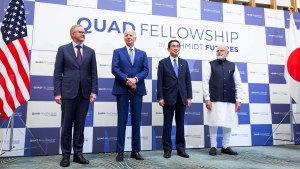 US Foreign Policy
US Foreign Policy
Advancing the group's pillars of prosperity and development will be at the very heart of competition with China in the coming decade.
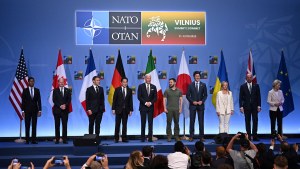 Public Opinion
Public Opinion
As the war in Ukraine continues, majorities say the United States should maintain or increase its commitment to NATO.
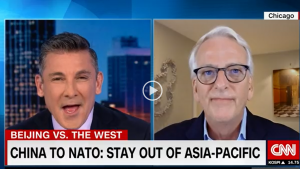 Defense and Security
Defense and Security
"The idea that somehow NATO has no interest in the Pacific and should stay away is a misnomer and is not going to happen," says Council President Ivo Daalder on CNN.
